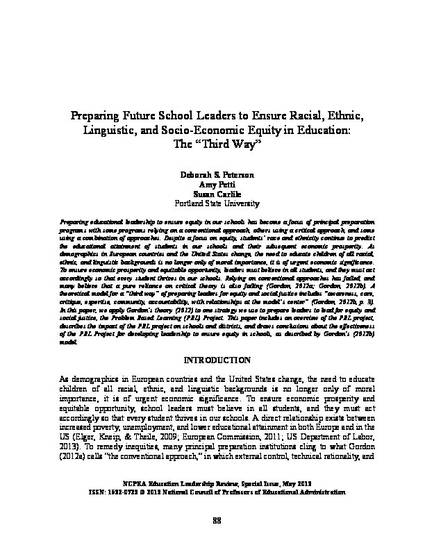
- Educational leadership -- United States,
- School administrators -- Training of -- United States,
- School management and organization
Preparing educational leadership to ensure equity in our schools has become a focus of principal preparation programs with some programs relying on a conventional approach, others using a critical approach, and some using a combination of approaches. Despite a focus on equity, students' race and ethnicity continue to predict the educational attainment of students in our schools and their subsequent economic prosperity. As demographics in European countries and the United States change, the need to educate children of all racial, ethnic, and linguistic backgrounds is no longer only of moral importance, it is of urgent economic significance. To ensure economic prosperity and equitable opportunity, leaders must believe in all students, and they must act accordingly so that every student thrives in our schools. Relying on conventional approaches has failed, and many believe that a pure reliance on critical theory is also failing (Gordon, 2012a; Gordon, 2012b). A theoretical model for a "third way" of preparing leaders for equity and social justice includes "awareness, care, critique, expertise, community, accountability, with relationships at the model's center" (Gordon, 2012b, p. 3). In this paper, we apply Gordon's theory (2012) to one strategy we use to prepare leaders to lead for equity and social justice, the Problem Based Learning (PBL) Project. This paper includes an overview of the PBL project, describes the impact of the PBL project on schools and districts, and draws conclusions about the effectiveness of the PBL Project for developing leadership to ensure equity in schools, as described by Gordon's (2012b) model.

This is the publisher's final PDF. Originally published in NCPEA Education Leadership Review (www.ncpeapublications.org)